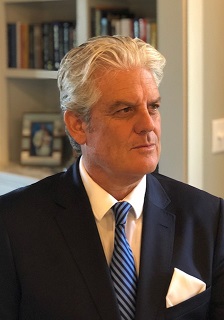From the CEO – March 2022
“Life begins on the other side of despair.”
— Jean-Paul Sartre

Dear Clients,
The opening quote appears somewhat maudlin, I agree. But the state of the world at present – and the extent to which geopolitical risk generated by the war and the lingering effect of the pandemic permeates much of our everyday lives, business and investment decisions and asset behavior – is unparalleled in recent times. There appears to be very few bright spots on the immediate horizon.
Notwithstanding the brutality of the invasion, it’s impact beyond Ukraine’s borders has as much to do with military and economic alliances and dependencies as they do the interconnectedness of the world, which includes everything from supply chains to information shared on social media platforms. These relationships tend to distinguish much of the present conflict in Ukraine from the last major European wars some eight decades ago.
Yet there is a relationship between Sartre and the belief system underlying existentialism and managing political risk that is especially instructive now. Here it is:
In short, Sartre held individual freedom as paramount. With freedom came a measure of individual responsibility over thoughts and actions. As such, some imperatives were manifest, including making individual choices in a world afflicted by conflict (recall existentialism gained popularity during WW2); that resort to systems of law or convention as a guide to these decisions may not be sufficient; that the quest for certainty (however defined) is often unachievable; and that creating meaning in life can rest on building relationships between people.
To be sure, the war in Ukraine has done much to challenge the globalized world, as did the pandemic. From supply shocks and price inflation to the rise of less-than-open or democratic regimes and undemocratic practices. The war has also helped create the need to redraw lines of trade and investment in a way that is more consistent with foreign policy goals. There is also talk of self-reliance in production.
As such, there is now serious debate about a new global order that seeks to repudiate much of the rules-based world built around various institutions since the end of WW2. The order sees spheres of influence in trade and commerce centered around Asia, Europe, and the Americas. Liberalism and democracy as organizing principles are being challenged, along with inevitable outcomes ranging from media censorship and the prohibition of legitimate political debate.
In this environment, geopolitical risk analysis is being challenged. If we are living through the emergence of a new world order, the benefit of top-down analysis (the kind offered by the ‘talking head’/policy wonk) might be limited, and certainly quant-based approaches that have predictive value and relevance to asset behavior become all at the more important. The latter rejects simply assigning random probabilities to an event and includes data series that precedes the last new world order of the late 1980s and early 1990s. Baseline measurements are required, and they should be amenable to various country risk mitigation stratagems.
On the latter, I’m referring to the range decisions that should be made by firms and organizations, from identifying the various sources of country exposure across all products and services and across all subsidiaries, to adopting various mitigation techniques such as credit default swaps (very important in an era of inflation and surging servicing costs). Co-financing activities, so that the risk burden can be shared between private and public entities, are also important, as well as performance guarantees.
Clearly, there are other risk mitigation systems. But the point is that much like the world in which Sartre and those espousing existentialism operated, we are living through a time when adaptability and responsibility will prove more advantageous as sources of guidance than structures from the past. Geopolitical risk analysis is therefore best suited when it can combine and provide empirically derived direction forward and individually tailored risk mitigation techniques.
* * *
Turning to the ratings for the month, some standouts are worth noting. In the Americas, Argentina managed to secure a $44bn debt deal with IMF, which replaces the ‘failed’ $57bn deal of 2018. In El Salvador, a SOE was declared over gang violence, while the plans for the issuance of the ‘volcano bond’ were delayed.
Over in Europe, France’s election is fast approaching, and Le Pen is closing the gap with Macron. This should be particularly interesting during the second round of voting. In Slovakia, public opinion is shifting against Russia’s invasion of Ukraine, as FXRs trend lower. Not surprising, Russia’s economy is expected to contract between 15-20% this year, with inflation running north of 15%.
Looking at Asia, the approval rating for Kashida’s cabinet is now at about 60%, largely on the back of the government’s war response, and consumer confidence in Thailand is sagging given surging inflationary pressures, supply shortages, and reports of hoarding.
In the Middle East, wheat shipments to Egypt are strained, as Sisi orders price controls to combat inflation. Lebanon’s parties are jockeying to gain a majority in the country’s parliament, as food scarcity has appeared, and wheat shipments have been halted.
Finally, in Africa, Burkina Faso has sworn-in its transitional assembly while Islamic extremists continue their assault on government troops. Guinea Bissau managed to thwart a coup attempt in February, but food shortages and inflation are fueling protests as the government cracks down on human rights advocates.
* * *
I’ll be meeting the deputy governor and staff from Philippines’ Central Bank in DC next month, as part of that group’s continuing dialogue with PRS on the various reforms the country has made on the socio-economic front. A similar tête-à-tête is planned with the finance ministry of the DRC, as they look to discuss the use of credible data to help reduce graft via democratic processes.
We have received considerable demand for our recently-released new addition to our popular Researchers’ Dataset series – one that offers clients a more granular look at the political risk components of the ICRG, supported by 20 years of monthly data. The new series works as an excellent complement to the other data bundles announced this year affecting ESG, corruption, and internal/external conflict. Scores of academic studies have been conducted using these series, providing unique insights in asset volatility, government responses to the pandemic, and many more. Contact us for more information.
Our new book Quid Periculum? Measuring & Managing Political Risk in the Age of Uncertainty, co-edited and co-authored by Peter Marber (Harvard/Aperture Investors) is now available! The book includes such diverse topics as risk forecasting techniques, reliability measures, the impact of political risk on asset prices and sovereign debt workouts. Also featured is a special roundtable discussion by some of the world’s leading voices in the field on the future of political risk, who combine to address some of the challenges presented by globalization and COVID-19.
March was another fruitful month for new and returning clients, ranging from some of the world’s top universities to the largest institutional investors throughout the US, Europe, the UK, and the Middle East and Asia. Our data are now regularly featured in the research of the IMF, Bank for International Settlements, and various central banks, such as the Bank of Italy.
The new look of PRS is coming in April, too. Paying homage to our roots in the Hindu Arabic number system of the Renaissance period to more recently in the behavioral revolution of the late 1960s, one of our new features will be a regular podcast series, featuring interviews and discussions with some of the most distinguished practitioners and academics in the field of geopolitical risk, from such places as Saudi Arabia, Uzbekistan, the UK, and Dubai. No other podcast series will offer such depth, relevance, and intellectual sophistication. Stay tuned.
Not only is ICRG being used by some of the world’s largest technology firms, but the data are now being incorporated increasingly into the artificial intelligence/machine learning sector, with an emphasis on ESG data!
Our ICRG political risk scoring changes were very robust in November, affecting some 110 countries (of 141) and over 125 individual political risk metrics!!
The ICRG data series continues to be the gold standard by which all other series are judged, particularly within the scholarly and research communities. As the war in Ukraine continues – and the implications of various resolutions are bandied about – an interesting study by Brookings, using our ICRG data in part, shed some light on the impact of external wars versus internal conflicts on ‘state capacity’ (viz., the ability of governments to achieve policy goals). (https://lnkd.in/dJS8qdV4)
Additionally, on the implications of the Russia/Ukraine conflict on investment, trade and overall economic growth, our ICRG data have been used extensively. See the following links for complete articles:
- The relationship between violent conflict and FDI: (https://lnkd.in/dWUrJvUB)
- The impact of armed conflict on bilateral trade flows: (https://lnkd.in/djjEAADx)
- The connection between defense spending and economic growth: (https://lnkd.in/dVXqpjcK)
Finally, did you know that, using our ICRG data in part, the macroeconomic costs of conflict are generally very large, with GDP per capita about 28% lower ten years after conflict onset. This is overwhelmingly driven by private consumption, which falls by 25% ten years after conflict onset.
(https://bit.ly/3Ds2QpS)
Thanks for your continued support, and please contact us if we can be of any assistance.

Chief Executive

PRS INSIGHTS
Moving beyond current opinions, a seasoned look into the most pressing issues affecting geopolitical risk today.
EXPLORE INSIGHTS SUBSCRIBE TO INSIGHTS
